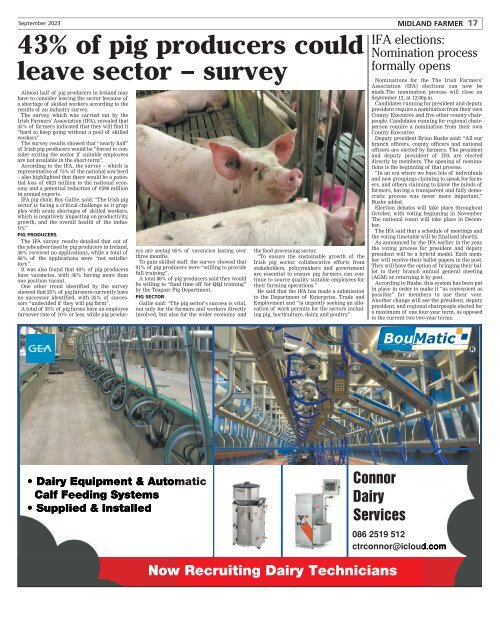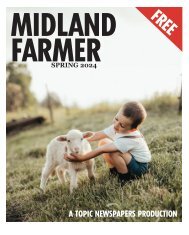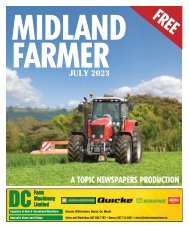Create successful ePaper yourself
Turn your PDF publications into a flip-book with our unique Google optimized e-Paper software.
<strong>September</strong> <strong>2023</strong><br />
43% of pig producers could<br />
leave sector – survey<br />
Almost half of pig producers in Ireland may<br />
have to consider leaving the sector because of<br />
a shortage of skilled workers according to the<br />
results of an industry survey.<br />
The survey, which was carried out by the<br />
Irish <strong>Farmer</strong>s’ Association (IFA), revealed that<br />
43% of farmers indicated that they will find it<br />
“hard to keep going without a pool of skilled<br />
workers”.<br />
The survey results showed that “nearly half”<br />
of Irish pig producers would be “forced to consider<br />
exiting the sector if suitable employees<br />
are not available in the short-term”.<br />
According to the IFA, the survey – which is<br />
representative of 75% of the national sow herd<br />
– also highlighted that there would be a potential<br />
loss of €623 million to the national economy<br />
and a potential reduction of €396 million<br />
in annual exports.<br />
IFA pig chair, Roy Gallie, said: “The Irish pig<br />
sector is facing a critical challenge as it grapples<br />
with acute shortages of skilled workers,<br />
which is negatively impacting on productivity,<br />
growth, and the overall health of the industry.”<br />
PIG PRODUCERS<br />
The IFA survey results detailed that out of<br />
the jobs advertised by pig producers in Ireland,<br />
36% received no applications, while a total of<br />
66% of the applications were “not satisfactory”.<br />
It was also found that 48% of pig producers<br />
have vacancies, with 36% having more than<br />
one position vacant.<br />
One other trend identified by the survey<br />
showed that 25% of pig farmers currently have<br />
no successor identified, with 35% of successors<br />
“undecided if they will pig farm”.<br />
A total of 35% of pig farms have an employee<br />
turnover rate of 10% or less, while pig producers<br />
are seeing 65% of vacancies lasting over<br />
three months.<br />
To gain skilled staff, the survey showed that<br />
91% of pig producers were “willing to provide<br />
full training”.<br />
A total 88% of pig producers said they would<br />
be willing to “fund time off for QQI training”<br />
by the Teagasc Pig Department.<br />
PIG SECTOR<br />
Gallie said: “The pig sector’s success is vital,<br />
not only for the farmers and workers directly<br />
involved, but also for the wider economy and<br />
the food processing sector.<br />
“To ensure the sustainable growth of the<br />
Irish pig sector, collaborative efforts from<br />
stakeholders, policymakers and government<br />
are essential to ensure pig farmers can continue<br />
to source quality suitable employees for<br />
their farming operations.”<br />
He said that the IFA has made a submission<br />
to the Department of Enterprise, Trade and<br />
Employment and “is urgently seeking an allocation<br />
of work permits for the sectors including<br />
pig, horticulture, dairy, and poultry”.<br />
MIDLAND FARMER<br />
17<br />
IFA elections:<br />
Nomination process<br />
formally opens<br />
Nominations for the The Irish <strong>Farmer</strong>s’<br />
Association (IFA) elections can now be<br />
made.The nomination process will close on<br />
<strong>September</strong> 12, at 12:00p.m.<br />
Candidates running for president and deputy<br />
president require a nomination from their own<br />
County Executive and five other county chairpeople.<br />
Candidates running for regional chairperson<br />
require a nomination from their own<br />
County Executive.<br />
Deputy president Brian Rushe said: “All our<br />
branch officers, county officers and national<br />
officers are elected by farmers. The president<br />
and deputy president of IFA are elected<br />
directly by members. The opening of nominations<br />
is the beginning of that process.<br />
“In an era where we have lots of individuals<br />
and new groupings claiming to speak for farmers,<br />
and others claiming to know the minds of<br />
farmers, having a transparent and fully democratic<br />
process was never more important,”<br />
Rushe added.<br />
Election debates will take place throughout<br />
October, with voting beginning in November.<br />
The national count will take place in December.<br />
The IFA said that a schedule of meetings and<br />
the voting timetable will be finalised shortly.<br />
As announced by the IFA earlier in the year,<br />
the voting process for president and deputy<br />
president will be a hybrid model. Each member<br />
will receive their ballot papers in the post.<br />
They will have the option of bringing their ballot<br />
to their branch annual general meeting<br />
(AGM) or returning it by post.<br />
According to Rushe, this system has been put<br />
in place in order to make it “as convenient as<br />
possible” for members to use their vote.<br />
Another change will see the president, deputy<br />
president, and regional chairpeople elected for<br />
a maximum of one four-year term, as opposed<br />
to the current two two-year terms.<br />
• Dairy Equipment & Automatic<br />
Calf Feeding Systems<br />
• Supplied & Installed<br />
Connor<br />
Dairy<br />
Services<br />
086 2519 512<br />
ctrconnor@icloud.com<br />
Now Recruiting Dairy Technicians
















